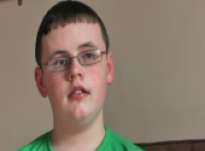Jhon

When Jhon was born his parents took part in a lung and asthma study that has involved annual questionnaires. Jhon recently took part in the second stage of this long term study at his school which was an allergy survey.
Jhon, aged 13 is White British, lives with his parents and attends Secondary School. He enjoys 'making a difference', swimming, reading and being with friends. Jhon was diagnosed with Osteogenesis Imperfecta in the womb.
More about me...
Jhon is 13 years of age. He currently attends Secondary School and enjoys ‘making a difference’, swimming, reading and being with friends. Jhon was diagnosed with Osteogenesis Imperfecta (causing bones to break easily) when in the womb and continues to have regular treatment and check-ups at his local hospital. He has had biopsy tests for himself, and also for research. He also acts as a “Dummy” for student doctors to try out their skills when he is having treatment for his Osteogenesis Imperfecta.
Jhon is supportive of research and enjoys taking part. Jhon says that it is important for young people to take part in research to help others. Having taken part in the second stage of a long term study (a cohort study) at school, Jhon said he would like more detailed information about studies to be given to young people. He particularly feels that the researcher’s need to be honest about any potential side effects and that the results of studies should be explained clearly and in a way that young people can understand.
Jhon also talks about the reward for taking part. He feels that some sort of recognition for taking part is important, even if it is vouchers at the end of the study. Jhon feels that recognition is very important if the clinical trial is ‘risky’, but should not be confused with being a ‘bribe’.
In giving advice to other young people who may be thinking of taking part in a clinical trial or a research study, he says, “If you’ve got any questions write them down so you don’t forget. And then when you get there or before you get there contact them, or speak to your parents and say, “Could you answer these questions for me?” He continues “Just make sure you’ve asked your questions before you do it because it’s important that you know what you’re doing before you go ahead and do it”.
Jhon is keen to continue taking part in the research about asthma to help other people, even though it isn't going to benefit him directly.
Jhon is keen to continue taking part in the research about asthma to help other people, even though it isn't going to benefit him directly.
Jhon recently had some allergy tests and completed a questionnaire as part of the study. The tests were all done at school and didn't take very long.
Jhon recently had some allergy tests and completed a questionnaire as part of the study. The tests were all done at school and didn't take very long.
Jhon enjoyed taking part, but he isn't quite sure what will happen with all the data they collect and thinks a little more information would be nice.
Jhon enjoyed taking part, but he isn't quite sure what will happen with all the data they collect and thinks a little more information would be nice.
The last thing I heard was sort of that day when they did the tests, sort of just saying that I was okay. And that’s the last thing I’ve heard. They’ve said that sort of they’ll be doing the tests, they’ll look at them overall, but it’s not going to be sort of for a while until sort of, because they’re saying those surveys that have been done by parents will be used and compared with the tests. And they’ll look at you overall sort of when we’re adults, sort of so they can look at a whole childhood. And then they will sort of be looked at overall from everyone that’s been involved.
So it’s, because it’s ongoing, so it’s not going to, they’re not going to know anything till the end. So I wonder if you’ll get anything in between that to say, “Well, this is where we’re at now.”
I think it would be nice to sort of know how it’s, sort of how they’re doing with it all. Because sort of it was sort of very much, “You’re going to do this now” sort of these tests, and I’d not heard anything from them before. And I’ve not heard anything since.
Young people would like to know that the information they have given to health professionals is valued. Jhon suggest that one way of doing this is with annual updates on how the trial is progressing.
Young people would like to know that the information they have given to health professionals is valued. Jhon suggest that one way of doing this is with annual updates on how the trial is progressing.
Jhon has not taken part in a clinical trial but he would consider taking part in a clinical trial if it was safe for him to do so.
Jhon has not taken part in a clinical trial but he would consider taking part in a clinical trial if it was safe for him to do so.

